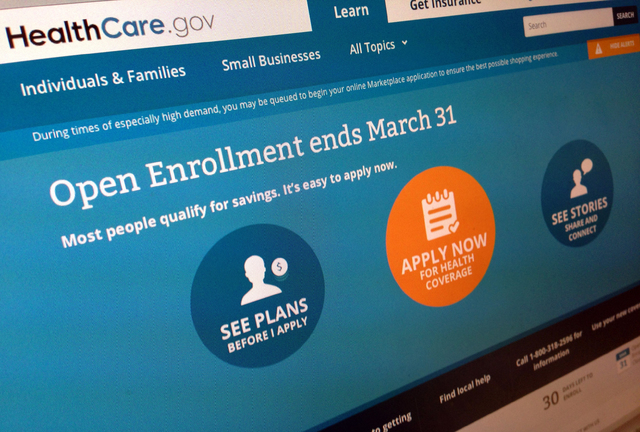Possible privatization of Medicaid Services raises concerns

Legislation that would have privatized Medicaid services for the elderly, the blind and the disabled in Nevada died in the Assembly Ways and Means Committee, but the concept survived after being grafted onto a different bill.
Senate Bill 514 was introduced a day before the June 1 adjournment and was quickly approved by the Legislature.
Advocates who raised concerns about defunct Assembly Bill 310 say they are worried about SB514. It’s unclear how many people would be affected under the newly passed bill, which as of Friday hadn’t been signed by Gov. Brian Sandoval.
At this point, it’s not known whether the switch would be good or have a negative impact, said Barbara Paulsen, whose Boulder City church is part of the advocacy group Nevadans for the Common Good.
“If there’s a transition, it needs to be carefully planned,” Paulsen said Wednesday. “It’s a major decision and people need to be aware of it and need to have an understanding of the steps being taken and the rationale and ability to comment on them.”
Section 37 of SB514 enables the state to consider the possibility of providing long-term services and support to the blind, elderly and disabled through a managed care model. The governor would have to make a recommendation, which would then have to be approved by the state’s Interim Finance Committee.
Before submitting a request to the federal Centers for Medicare and Medicaid Services to amend the state’s Medicaid plan to allow the privatization of those Medicaid services, the state’s Department of Health and Human Services would have to submit an analysis of the fiscal impact for the transition to the Interim Finance Committee, according to the bill.
“SB514 says that the state needs to study the fiscal impact. Our concern is that they also study the impact (on) the people receiving those services,” said Robert Hoo, with Nevadans for the Common Good, a broad-based coalition of institutions in the Las Vegas area advocating for several issues including those affecting senior citizens.
It would not be acceptable if the move would cut back on services, he said. If the transfer maintains and improves services and saves the state money, then that’s a “win-win.”
“It’s critical that there is an opportunity for public input, public feedback,” Hoo added Wednesday.
Advocates for the blind, disabled and elderly are also concerned about the potential for disruption of care and whether managed care organizations have the capacity to provide needed services.
Nevada currently contracts with two national, for-profit managed care organizations, Amerigroup Community Care and Health Plan of Nevada, which is owned by UnitedHealthcare. Most of the current services are for families and children, not groups targeted in SB514.
The state also has a $130 million contract — 38 percent coming from the state’s general fund and 62 percent coming from the federal government — with McKesson Health Solutions to manage care for the sickest fee for services Medicaid beneficiaries, according to a copy of the contract summary.
Fee for services is a delivery system where health care providers are paid per service, such as an office visit, a test or a procedure, according to the Centers for Medicare and Medicaid Services.
The state also offers services through waivers administered by the state’s Division on Aging and Disability Services.
Managed care services are delivered through contracted arrangements.
As a current contractor, Amerigroup has experience serving Medicaid members, said Eric Lloyd, Amerigroup Nevada’s president.
“Amerigroup has significant experience effectively managing these populations in many other states across the country,” he said in a statement on Wednesday. “If the state of Nevada decides to move forward, we would like to continue the positive partnership we share with the state to provide the right care and service excellence for all new members.”
Representatives with Health Plan of Nevada didn’t respond to requests for interviews.
Advocates hope that if the state moves forward with the transfer of services into managed care, that it will follow the best practices and guidelines from the Centers for Medicare and Medicaid Services, said Lynn Hunsinger, director of professional services for Nevada Senior Services, which provides adult day care and other services.
Although about 19 other states have already made this move, Nevada’s social services infrastructure is vastly different, she added.
There’s fear that some of the state’s most vulnerable people could fall through the cracks.
“Services are lean, and in some ways, there are already gaps in services that community providers can’t meet,” she said Friday.
Nevada Assembly Majority Leader Paul Anderson, R-Las Vegas, sponsored AB310, but previously declined to be interviewed because he said his bill wasn’t going anywhere. When called again after the passage of SB514, Anderson didn’t comment.
The language in SB514 permits the state — but does not require it — to implement the idea, said Richard Whitley, interim director for the state’s Department of Health and Human Services.
“The enabling language … allows Nevada to evaluate the long-term services and supports systems in the state and select the best method for providing these valuable services,” he said in a statement on Thursday. “The process used to evaluate any proposed changes will be transparent.”
The evaluation will include input from consumers, providers of services, elected officials and state staff, among others.
“After a thorough review of the state’s long-term services and supports needs, recommendations will be provided to the governor and to the Interim Finance Committee,” he said.
Contact Yesenia Amaro at yamaro@reviewjournal.com or 702-383-0440. Follow @YeseniaAmaro on Twitter.
RELATED:
Medicaid among many questions on health-care coverage
State offers assistance to those losing Medicaid coverage
Medicaid growth trims Nevada mental health costs












